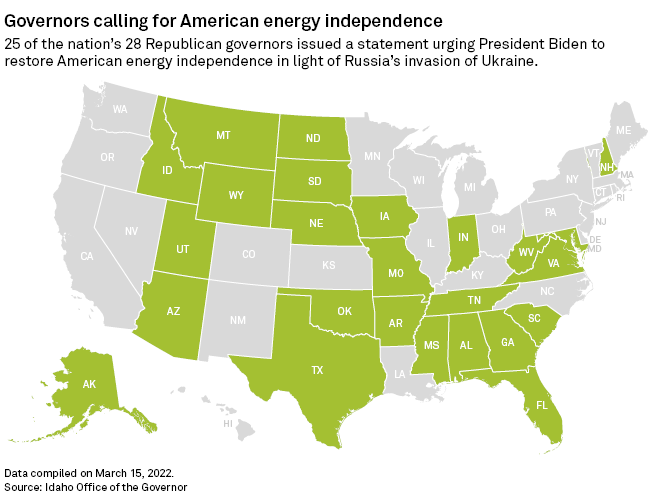Featured Topics
Featured Products
Events
S&P Global Offerings
Featured Topics
Featured Products
Events
S&P Global Offerings
Featured Topics
Featured Products
Events
S&P Global Offerings
Featured Topics
Featured Products
Events
Financial and Market intelligence
Fundamental & Alternative Datasets
Government & Defense
Professional Services
Banking & Capital Markets
Economy & Finance
Energy Transition & Sustainability
Technology & Innovation
Podcasts & Newsletters
Financial and Market intelligence
Fundamental & Alternative Datasets
Government & Defense
Professional Services
Banking & Capital Markets
Economy & Finance
Energy Transition & Sustainability
Technology & Innovation
Podcasts & Newsletters
Research — 22 Mar, 2022
Introduction
As the Russian invasion of Ukraine begins to change the direction of U.S. energy policy, governors across the country have started to weigh in on how the conflict could impact their states' energy situations.

While state-level governments are limited in how they can formally sanction Russia, many governors issued statements, executive orders or letters condemning the actions of the Russian military. Half of the U.S. governors called on President Joe Biden to focus on American energy independence. A handful of states also urged Congress to take action on suspending the federal gas tax as the price of gasoline skyrocketed to above-average levels.
The ongoing conflict in Ukraine indirectly impacts U.S. utilities and regulators. The implications are generally associated with escalating costs at a time when utility prices are trending upward due to other macroeconomic trends and industry-specific issues. The ban on Russian energy product imports could cause additional fuel price volatility for U.S. utilities and merchant providers.

Governors respond to conflict
In public statements, governors offered support of Ukraine and condemned Russia's military invasion. They urged Biden, Congress and federal agencies, to support the ban on imports of Russian oil, suspend the federal gas tax and increase U.S. domestic oil and gas production. An increasing number of governors also issued directives requiring state agencies, and in some cases urging businesses, to review, identify and terminate contracts with any ties to Russia, Russian nationals and even entities supporting Russia. The situation remains fluid as new details emerge daily.
While most governors delivered their State of the State address prior to the invasion of Ukraine, many mentioned energy issues, however briefly, and did so in the context of the transition to cleaner fuel sources, electric vehicles and an effort to embrace new energy technologies. For additional details on State of the State addresses, refer here: US governors place spotlight on EVs, clean energy in state addresses.
On March 4, nearly all U.S. Republican governors asked Biden to support what they described as efforts to restore American energy independence. "By removing [Biden's] bans on new oil and gas development on federal lands, building the Keystone XL pipeline and reinstating regulatory reforms to streamline energy permitting, we can protect our national energy security and sell to our friends rather than buy from our enemies — specifically Russia," the statement said.
Biden announced March 8 that the U.S. is banning all imports of Russian oil, gas and other energy, allowing companies to withdraw from existing contracts within 45 days. The policy also prohibits new U.S. investment in Russia's energy sector.
"The United States produces far more oil domestically than all of European — all the European countries combined," Biden said. "In fact, we're a net exporter of energy. So we can take this step when others cannot."
While the concept of energy independence has picked up steam in recent years, the idea has been around for decades, going as far back as the 1970s. According to U.S. Energy Information Association, in 2019, the U.S. became a net total energy exporter for the first time since 1952 and maintained that distinction in 2020.
At a March 14 Democratic National Committee event, Biden said Russia's invasion of Ukraine "is another reason why we have to get off our dependency on fossil fuels," adding, "Imagine where we'd be right now if, in fact, Europe was in fact free of fossil fuels and we were in a situation where ... it was all renewables. It'd be a different world."

Some governors see an opportunity to bring fossil fuel production back into the national energy conversation.
In a press release issued March 8, Alaska Gov. Mike Dunleavy, a Republican, requested Biden to focus on domestic energy production via fossil fuels. In a letter to the president, Dunleavy noted that "the Willow project in [the National Petroleum Reserve in Alaska] is nearly shovel ready and can provide a domestic source of oil." According to Dunleavy, production from the project "will also be much cleaner and better for the environment than the production of oil in Russia, which flares off large quantities of gas and methane."
In August 2021, a U.S. District Court judge in Alaska vacated permits for ConocoPhillips' Willow Project in the National Petroleum Reserve-Alaska. Approvals for the project were initially pushed through toward the end of the Trump Administration. However, with the federal ruling, the permits were sent back to the approving agencies for review. At the time of the ruling, Dunleavy said it was a "horrible decision" and had the project been developed, it would have produced over 160,000 barrels of oil a day and created thousands of jobs benefiting the state and the American people. On Feb. 3, the Bureau of Land Management initiated the process of accepting public input of supplemental analysis of the Willow Project. Public comments were due to the agency by March 9.
In a letter sent to Biden on March 15, Montana Gov. Greg Gianforte, a Republican, urged the president "to act immediately to make the United States energy independent" and end reliance on foreign energy. Gianforte listed potential steps that Biden can take, such as rescinding the termination of the Keystone XL Pipeline, revoking the suspension of oil and gas leases for portions of the Arctic National Wildlife Refuge, allowing new oil and gas leasing on federal lands, and encouraging the Federal Energy Regulatory Commission to reverse its guidelines to streamline the delivery of American energy resources.
New Jersey Gov. Phil Murphy, a Democrat, signed Executive Order No. 291 on March 2 requiring all agencies to "review their authority to suspend or revoke licenses, permits, registrations and certifications of businesses that invest directly in companies owned or controlled by the government of Russia, Belarus or its instrumentalities." Additionally, all relevant state agencies must undertake a review of New Jersey's ability to boycott or halt the import or purchase of any products or services provided from the Russian Federation or Belarus, including but not limited to food products, energy products and clothing products.
The executive order complements legislation prohibiting certain government dealings with businesses associated with Russia or Belarus. Senate Bill 1889 and Assembly Bill 3090, which were signed March 9, require the state Treasury Department to develop a list of persons and entities that it determines have engaged in prohibited activities in Russia or Belarus. Additionally, the measures prohibit the state from investing pension or annuity funds in an entity appearing on the list developed by the department.
North Dakota Gov. Doug Burgum, a Republican, issued a statement March 8 supporting the ban on the import of Russian oil, liquified natural gas and coal to the U.S., noting that U.S. "domestic energy production remains constrained by federal regulatory roadblocks, denial of critical infrastructure permits and canceled lease auctions on federal lands." In July 2021, North Dakota filed a lawsuit against the U.S. Interior Department and the Bureau of Land Management claiming that the cancellation and suspension of new oil and gas lease auctions on federal land and water were unlawful. The state attorney general estimated that the actions of the federal government cost North Dakota roughly $80 million in lost revenue, with the number possibly increasing in the future.
On March 1, Oklahoma Gov. Kevin Stitt, a Republican, sent a letter to President Biden announcing that Oklahoma is "ready to step up domestic production in an environmentally responsible way," and that the state can "significantly increase production to meet America's domestic needs and export energy to our allies, reducing their dependence on foreign adversaries."
In a March 7 letter sent to President Biden, Utah Gov. Spencer Cox, a Republican, encouraged the president to consider additional measures, including eliminating any barriers to increasing U.S. domestic oil and gas production. "For those who truly care about the environment and climate change, substituting American gas and oil for Russian gas and oil at home and abroad will make a significant impact on global carbon emissions," Cox wrote. The Utah governor stated that the federal government must improve its regulatory processes and reduce red tape to allow for the timely development of the state's resources by private industry.
West Virginia Gov. Jim Justice, a Republican, delivered a speech March 11 stating that U.S. "dependence on hostile foreign countries for these critical resources — including Russia — has put America in a position where aiding in Ukraine's defense is strategically precarious for the security of the country and the free world." Justice stated that the nation needs to be energy independent, and West Virginia has an abundance of resources, such as coal, oil and gas. Additionally, while Justice supports all forms of energy production, the governor noted that the timing was not right to rely solely on renewable energy.
In a statement released March 9, Wyoming Gov. Mark Gordon, a Republican, said Biden's order banning the import of Russian oil is "only half the solution." Gordon said the order should be accompanied by an additional order to "immediately resume federal onshore and offshore oil and gas lease sales, expedite the approval process of federal application for permits to drill and fast-track energy-related pipeline approvals to deliver energy to underserved areas across the nation."
"We must focus on producing homegrown energy for our domestic security and to combat inflation," said Gordon. EIA data shows that Wyoming produces 14 times more energy than it consumes, making it the nation's biggest net energy supplier. Additionally, Wyoming also produces more natural gas from federal leases than any other state.
On Feb. 24, Colorado Gov. Jared Polis, a Democrat, urged "Congress to immediately suspend the federal gas tax and double down on a rapid clean energy transition to ensure that our energy future cannot be tied to geopolitical conflicts and global commodities."
During the March 8 State of the State address, California Gov. Gavin Newsom, a Democrat, recognized the rising gas prices and pointed to his January proposal to suspend the state's gas tax; however, Newsom noted that impart to geopolitical uncertainty, "it's clear we must go further." Newsom warned of reverting back to certain energy sources, such as oil and other fossil fuels, which may have effects leading to catastrophic climate events. Instead, the governor reiterated the "importance of accelerating California's leadership in clean technology, this is not just a national security and an environmental justice imperative."
California legislation enacted in 2018 sets a goal of zero-emissions power by 2045, while an executive order was signed establishing a new target to achieve carbon neutrality by 2045.
Several bills are before the California Legislature that would advance Newsom's goal of pulling away for fossil fuels. Senate Bill 1322 would enact the California Oil Refinery Cost Disclosure Act, requiring refineries to report the gross and net margins of what it paid for each barrel of crude oil that was then refined into gasoline. A separate measure, Senate Bill 953, would require the State Lands Commission to terminate all remaining oil and gas leases under its jurisdiction in tidelands and submerged lands within state waters by Dec. 31, 2023.
Regulatory Research Associates is a group within S&P Global Commodity Insights.
S&P Global Commodity Insights produces content for distribution on S&P Capital IQ Pro.
This article was published by S&P Global Market Intelligence and not by S&P Global Ratings, which is a separately managed division of S&P Global.
